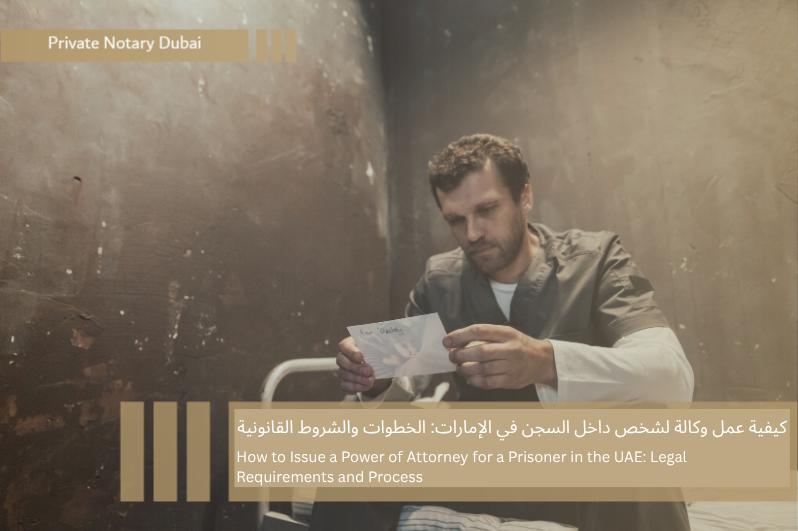Issuing a Power of Attorney (POA) for a person inside prison in the UAE is one of the most important legal procedures that enables detainees and convicted individuals to authorize a lawyer to represent them before judicial and legal authorities. This process ensures that prisoners can exercise their right to legal representation and follow up on their cases in a legitimate and organized manner without leaving the detention center.
The process of applying for a POA on behalf of a prisoner follows specific, coordinated procedures established by the Ministry of Justice in cooperation with the Ministry of Interior (Prisons Administration). This service reflects the UAE’s continuous efforts to preserve prisoners’ legal rights and facilitate proper judicial communication under official supervision.
Documents Required to Issue a Power of Attorney for a Lawyer in the UAE
To complete a POA request for a prisoner, several essential documents must be provided:
-
A copy of the Emirates ID or passport of the prisoner (principal).
-
A copy of the lawyer’s Emirates ID or professional license issued by the competent authority.
-
A certificate of imprisonment issued by the General Directorate of Prisons or the competent court.
-
A written request or letter from the prisoner expressing their desire to appoint the named lawyer.
-
Clear identification of the POA scope, limited to legal representation before courts or other judicial bodies.
-
Contact details for both the prisoner and the lawyer.
-
Any relevant supporting documents such as case numbers, court details, or legal correspondence if available.
Legal Conditions for Issuing a Lawyer’s Power of Attorney for a Prisoner in the UAE
The process of issuing a POA for a prisoner is governed by a set of legal conditions established jointly by the Ministry of Justice and the General Directorate of Prisons to ensure transparency, legality, and protection against any misuse.
Key conditions include:
-
Explicit consent of the prisoner: The POA cannot be issued unless the prisoner personally appears before an authorized notary or official delegate at the prison and clearly expresses their free and voluntary consent.
-
Full legal capacity: The prisoner must have full legal capacity to appoint a lawyer and delegate representation rights.
-
Limitation to legal representation only: The prisoner may issue a POA exclusively to a licensed lawyer for legal and judicial purposes. The authorization cannot include financial, property, or administrative powers.
-
Official notarization: The POA must be notarized by an authorized notary public registered with the Ministry of Justice, either by visiting the prison or through mobile notary services, ensuring full legal validity.
-
No conflict with judicial or enforcement orders: If the prisoner is under restrictions that limit representation or delegation, the notary must verify compliance with court permissions before notarization.
-
Formal submission of the request: The POA request must be officially submitted to the prison administration or through an approved electronic platform with all required documentation attached.
Steps to Issue a Power of Attorney for a Lawyer in the UAE
Once all conditions are met, the process of issuing a lawyer’s POA for a prisoner proceeds as follows:
-
A family member or the lawyer submits a formal POA request to the prison administration for approval.
-
The required documents are prepared, including identity proofs, imprisonment certificate, and the prisoner’s written consent.
-
The documents are sent to the authorized notary through official channels or electronically.
-
The notary prepares a POA draft in the legally accepted format, restricting the authority solely to legal representation.
-
The notary coordinates with the prison administration or the Public Prosecution Office to complete the notarization process, either electronically or through an on-site visit.
-
The notary verifies the prisoner’s identity, intent, and understanding of the authorization before proceeding.
-
Upon confirmation, the notary officially notarizes the POA.
-
The notarized POA is delivered to the appointed lawyer after registration and validation.
Remote notarization is also available in certain cases through online coordination between the prison administration and a licensed e-notary via secure video conferencing and digital signature authentication.
It is important to note that the only POA allowed for prisoners in the UAE is a lawyer’s power of attorney. This POA grants legal representation rights only and cannot be used for selling property, financial management, or administrative tasks. Any POA extending beyond this scope requires prior approval from the competent judicial authority.
Frequently Asked Questions (FAQs)
How can I request a lawyer’s power of attorney for a prisoner?
The request can be made in coordination with the prison administration and a licensed notary public. A relative or the lawyer submits a formal request, the necessary documents are prepared, and the notary finalizes the POA after verifying the prisoner’s consent.
Can a prisoner issue a POA for anyone other than a lawyer?
No. A prisoner in the UAE can only issue a POA to a licensed lawyer for the purpose of legal representation. Any other form of authorization is not permitted.
Our Legal Services
Our Private Notary Office in Dubai provides comprehensive assistance in preparing and notarizing lawyer’s powers of attorney for prisoners, both traditionally and electronically. Our legal team ensures all requirements are met, documents are verified, and the POA is drafted in full compliance with UAE law.
We guarantee your legal rights through an accurate and fully compliant process. Contact us today to start your request. Our services are available 24/7, in-person or online, to meet all your legal needs anywhere and anytime.
Abdul Hamid is a legal consultant with extensive experience in providing legal advice in the United Arab Emirates. His expertise focuses on legal drafting, resolving commercial disputes, and drafting and reviewing corporate and employment contracts.

